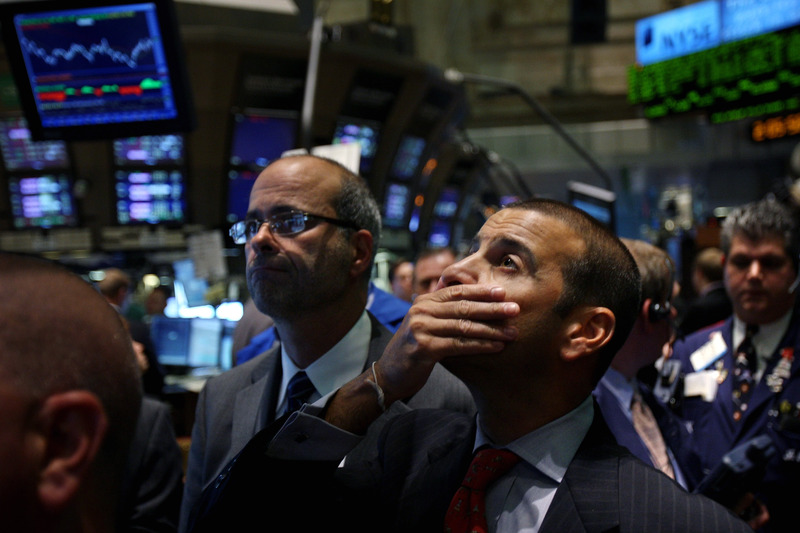Investing
DJIA Now Down 1,000 Points, Emerging and International Markets Differ
Published:
The Dow Jones Industrial Average (DJIA) was down more than 140 points after a dismal ISM manufacturing report on Monday. What stands out here is that the DJIA is now down 1,000 points from its high. We can all blame China and a currency crisis involving many emerging markets. There may just be the simple logic that this stock market needed to sell off handily, and any excuse for a sell-off was good enough.
24/7 Wall St. now shows a drop of 146 points to 15,552.55, and that takes the market more than 1,000 points under the 16,588.20 high from December 31, 2013. The DJIA was down close to 5.5% in January, and the new 1,000-point drop is a correction of 6% from the December 31 highs.
Meanwhile the S&P 500 was down by 3.6% in the month of January. Monday’s drop of 13 points to 1,769.50 on Monday morning puts the index now down 4.4% from the high of 1,850.84.
Where things get real interesting is that the emerging markets are leading the drop, and the drop may not be over. Japan is formally in 10% correction mode. Two key Japan ETFs are reflecting this drop. The iShares MSCI Japan (NYSEMKT: EWJ) ETF is down 1.5% on Monday at $11.15, a drop of 10.3% from its 52-week high of $12.43. This is the oldest and most widely followed Japan ETF.
Then there is the WisdomTree Japan Hedged Equity (NYSEMKT: DXJ) ETF, which aims to eliminate any fluctuation of the Japanese yen in the calculations. After dropping 2.3% on Monday to $45.51, this ETF is down by more than 15% from the 52-week high of $53.95. What drove the popularity of this ETF in 2013 was the pure money printing and inflation creation efforts from the Bank of Japan. By eliminating the currency risk, investors had a pure-play on the market appreciation without having to worry if the yen fell handily.
The MSCI Emerging Markets Index fell by 6.6% in January, making its drop worse than the DJIA and the S&P 500. The iShares MSCI Emerging Markets (NYSEMKT: EEM) tracks the index, but has much dependence on Chinese and Hong Kong-listed equities. After a 1.7% drop to $37.55 on Monday, the iShares MSCI Emerging Markets ETF is down 15.5% from the high of $44.43. It was also down 8.6% in the month of January.
Oddly enough, the pre-emerging markets — the frontier markets — actually held their ground, despite the U.S. following China and emerging markets south. The MSCI Frontier Markets 100 Index managed a tiny 0.4% gain in January. The iShares MSCI Frontier 100 (NYSEMKT: FM), which aims to track the same index, rose 0.2% in January. After a 0.7% drop to $33.55 in mid-morning Monday trading, the ETF was down 3.6% from its 52-week high of $34.82.
If emerging markets are not the real blame for the sell-off, then China is. China is closed for Chinese New Year, but the iShares China Large-Cap (NYSEMKT: FXI) sums up the real losses here. After a drop of almost 1.5% on Monday morning to $34.08, this ETF is down 17.5% from its 52-week high of $41.30. Its performance in January was -9.9%.
The average American spends $17,274 on debit cards a year, and it’s a HUGE mistake. First, debit cards don’t have the same fraud protections as credit cards. Once your money is gone, it’s gone. But more importantly you can actually get something back from this spending every time you swipe.
Issuers are handing out wild bonuses right now. With some you can earn up to 5% back on every purchase. That’s like getting a 5% discount on everything you buy!
Our top pick is kind of hard to imagine. Not only does it pay up to 5% back, it also includes a $200 cash back reward in the first six months, a 0% intro APR, and…. $0 annual fee. It’s quite literally free money for any one that uses a card regularly. Click here to learn more!
Flywheel Publishing has partnered with CardRatings to provide coverage of credit card products. Flywheel Publishing and CardRatings may receive a commission from card issuers.
Thank you for reading! Have some feedback for us?
Contact the 24/7 Wall St. editorial team.